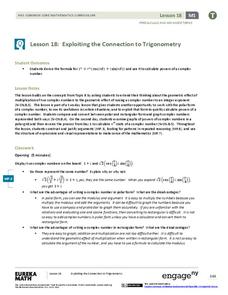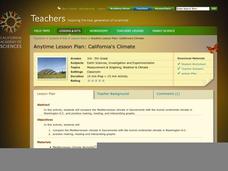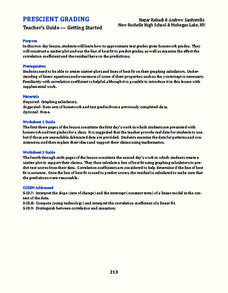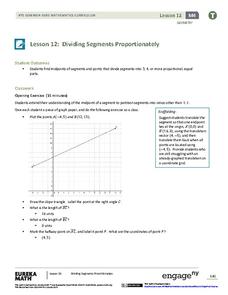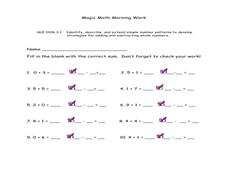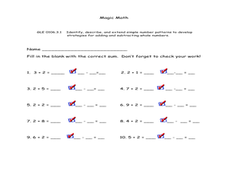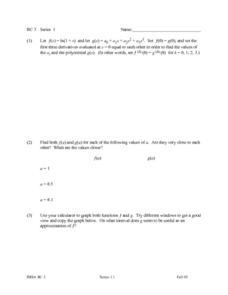PBS
Working with Coordinate Planes: Assessments
It's time for scholars to show what they know about coordinate planes with a collection of three assessments. The exams' objectives include plotting points on a single grid, measuring using the distance formula, and identifying points on...
Balanced Assessment
Shirts and Flags
Learn the importance of geometry to tailors. Given a shirt sewing pattern, scholars determine the actual size of the shirt. After which they answer questions that require problem solving and extending their understanding of scale.
PBS
Working with Coordinate Planes: Activities and Supplemental Materials
Seven activities make up a collection of supplemental materials to reinforce graphing on a coordinate plane. Worksheet objectives include plotting coordinates within single and four quadrants, measuring straight and diagonal lines, and...
EngageNY
Exploiting the Connection to Trigonometry 1
Class members use the powers of multiplication in the 19th installment of the 32-part unit has individuals to utilize what they know about the multiplication of complex numbers to calculate the integral powers of a complex number. Groups...
Noyce Foundation
Boxes
Teach your class to think outside the box. Scholars use the concept of equality to solve a problem in the assessment task. They determine how to use a scale to identify the one box out of a set of nine boxes that is heavier than the others.
Curated OER
Sentence Combining/Sentence Variety
Challenge your writers to improve their writing by introducing them to 10 strategies they can use to vary their sentence structures. Each strategy is described and examples given. Pupils then create their own sentences using this...
EngageNY
Logarithms—How Many Digits Do You Need?
Forget your ID number? Your pupils learn to use logarithms to determine the number of digits or characters necessary to create individual ID numbers for all members of a group.
California Academy of Science
California's Climate
The United States is a large country with many different climates. Graph and analyze temperature and rainfall data for Sacramento and Washington DC as you teach your class about the characteristics of Mediterranean climates. Discuss the...
DK Publishing
Mary Sorted Her Snails
Mary needs help sorting her snails! Each snail has one of three distinct patterns on its shell, and scholars sort each into the proper category. Then, they count the number of snails in each pattern group (triangles, circles, and zigzag)...
Curated OER
Matching the Shapes
Which of these blocks match? As they learn about shape attributes and the term same, scholars draw lines from block formations on the left to the same shapes on the right. The eight starting shapes are split into two sections to make...
Curated OER
Composite Functions and Inverse Functions
In this function worksheet, students complete five lessons all with exercise sets, examples, and definitions, and one set of miscellaneous exercises. The concepts covers include: composite functions, inverse functions, graphs of...
Curated OER
Magnetism
In this magnetism worksheet, students answer ten questions about magnets, their magnetic poles, the magnetic lines of flux and how magnets work.
Curated OER
Strike a Pose: Modeling in the Real World (There's Nothing to It!)
Adjust this lesson to fit either beginning or more advanced learners. Build a scatter plot, determine appropriate model (linear, quadratic, exponential), and then extend to evaluate the model with residuals. This problem uses real-world...
Curated OER
Elephant Earth Adventures . . .
In this reading comprehension about African elephants worksheet, students read factual passages about their physical characteristics, amazing facts, tusk uses, ears, trunk, skin, movement, food needs, extended families, and the active...
National Security Agency
Multiple Representations of Limits
After an introductory activity to demonstrate the theory of a limit, additional activities approach a limit from graphical, numerical, and algebraic methods. The activity looks at the multiple ways of understanding and evaluating a limit.
Curated OER
Activity: Gummy Bear Genetics
Who's your Daddy ... and Mommy for that matter? Given a first-generation group of gummy bear offspring, young scientists must determine which bears are their parents. An activity worksheet covers the differences in genotypes and...
It's About Time
Slinkies and Waves
Slinkies® are a great tool for visualizing waves. Pupils work in groups to create both transverse and longitudinal waves before using a polarizer to analyze the ways they are able to travel.
Curated OER
Prescient Grading
Do homework grades really determine test scores? Learn whether lines of best fit, correlation coefficients, and residuals can be used to determine test scores when given homework grades. (It would certainly save teachers time in grading...
Maryland Department of Education
The Concept of Identity Lesson 7: Logical Fallacies
What are the effects of competition in an academic environment? The competition between the main characters in A Separate Peace motivates a series of activities that asks readers to take a stance on competition, and then to develop a...
EngageNY
Dividing Segments Proportionately
Fractions, ratios, and proportions: what do they have to do with segments? Scholars discover the midpoint formula through coordinate geometry. Next, they expand on the formula to apply it to dividing the segment into different ratios and...
Curated OER
Magic Math Morning Work
In this doubles addition worksheet, students add doubles of one digit numbers up to the number 10. Students complete 10 addition problems.
Curated OER
Magic Math: sums of 2
For this addition worksheet, students add one digit numbers to the number 2 and check it with the subtraction fact. Students complete 10 problems.
Curated OER
Magic Math
In this addition and subtraction worksheet, learners solve the one digit addition and subtraction problems and create its counterpart number sentence. Students complete 10 problems.
Curated OER
BC Series 1 - Derivatives
In this function worksheet, students find the derivatives of a function. They graph each function and determine the interval. This three-page worksheet contains 8 problems.





